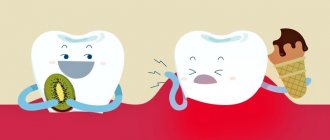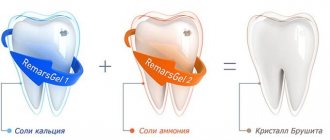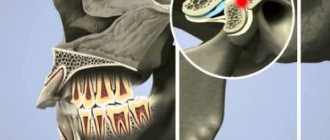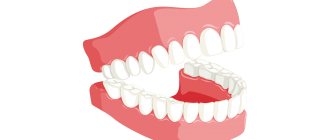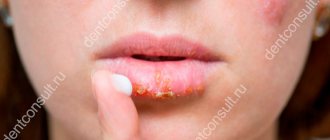During pregnancy
This is by far the most beautiful moment in every woman’s life is associated with numerous difficulties.
In particular, representatives of the fair sex who are carrying a fetus often exhibit hyperesthesia. This happens as a result of increased stress on the body, hormonal imbalances, metabolic disorders and decreased immunity. While studying available materials, how to soothe sensitive teeth and what to do at home, know that you cannot ignore alarming manifestations. Getting rid of pain and discomfort on your own is very difficult and often unsafe. Especially considering the position of the expectant mother. When pathology is discovered during pregnancy, you must immediately contact a specialist. Only an experienced dentist will be able to prescribe appropriate therapy and a course of health procedures.
Ideally, the condition of dental elements should be taken care of at the stage of maternity planning. Accustom yourself to preventive procedures, eat right, and don’t be afraid to visit the dental office once again. It is necessary to introduce into the diet foods enriched with vitamins C and D, magnesium and calcium.
As a reaction to hot and cold
This is the first sign of hypersensitivity. The range of sensations in this case can be different, from sharp, bright pain in one point, which quickly disappears, to a prolonged pain syndrome of a weak nature in several at once. Manifestations can be caused by minor thinning of the enamel layer or more serious pathological processes. This is why you should not put off going to the doctor. Only a professional will be able to understand the problem and recommend effective methods for eliminating hyperesthesia. If a pathology is discovered, the doctor will carry out appropriate treatment, and he will decide what to do and how to treat highly sensitive teeth only after examining the patient.
The tooth reacts to sour: what to do and what are the reasons
If your teeth react to sour foods, or discomfort occurs when eating sour foods, immediately seek help from a dental clinic. The doctor will conduct a comprehensive diagnosis, determine the type and complexity of the problem, and prescribe adequate treatment that will help eliminate pain and discomfort.
Note! With increased tooth sensitivity to acid, it is not the enamel (protective layer) that becomes sensitive, but the dentin (loose layer), in which the neurovascular fibers are located. Pain can be caused by various reasons: from mechanical damage to the protective enamel to diseases of the gastrointestinal tract. The exact cause can only be determined after a comprehensive examination of the patient. Dentists note that in 95% of cases, the cause of hypertension is the following factors:
- Mineral deficiency is accompanied by gradual weakening, demineralization and subsequent destruction of hard tooth tissues. The main symptom of mineral deficiency in the early stages of the problem is increased tooth sensitivity to acidic foods;
- Pathogenic microorganisms - the penetration of pathogenic microorganisms into the mucous membrane of the oral cavity can provoke intense release of acid, which aggressively affects tooth enamel. The acid penetrates the protective barrier of the enamel and causes a pain reaction in the nerve bundle inside the tooth;
- Gastrointestinal dysfunction is one of the most common causes. A number of diseases of the human gastrointestinal tract can provoke a change in the composition of saliva - this composition has a destructive effect on the enamel (gradually destroys it) and increases the overall sensitivity of the teeth. In this case, the reaction will be not only to sour, but also to sweet, as well as temperature changes (cold/hot);
- Caries is the most common problem that causes tooth pain from sour foods. It is accompanied by carious lesions of the enamel, with further spread deep into the hard dental tissues. With the development of caries, the intensity of pain increases;
- Mechanical injuries - chips, cracks and microcracks in the protective enamel, are the gateway for the penetration of acid into dentin, which causes an increased pain reaction of the tooth to the irritant.
In addition to the above problems that can cause tooth pain after sour, it is also worth noting: pulpitis, malocclusion, pathological abrasion of teeth, wedge-shaped defect, diseases of the endocrine system, genetic predisposition, pathologies of the nervous system, etc.
Tooth sensitivity (hyperesthesia)
Encyclopedia of Health / Encyclopedia of Diseases
In general, there is nothing wrong with excessive sensitivity - but only if it is a property of your character, and not of your tooth enamel. If teeth react painfully to cold, sour and sweet foods, this can and should be dealt with.
What exactly hurts?
The pain with hyperesthesia of tooth enamel is short, no longer than 30 seconds, but at the same time stinging and sharp, like the blow of a dagger.
| WHAT IF THIS IS INFLAMMATION? Sensitivity to hot and cold may persist for some time after dental treatment. The reason is mild inflammation of the pulp, which usually goes away after a few weeks. But sometimes such sensitivity signals a serious inflammatory process in the tooth. Here are the signs for which you should definitely consult a doctor :
|
If more than a quarter of all teeth have excessive sensitivity, they speak of generalized hyperesthesia; if less, we are talking about a localized form.
Where does this pain come from? It is not the tooth enamel that is highly sensitive, but the looser layer underneath it, the dentin. Enamel, like strong armor, protects this vulnerable tissue from the aggressive effects of various factors. However, for a variety of reasons, tooth enamel can become thinner and even destroyed, and then the dentin remains defenseless.
However, destruction of tooth enamel alone is not enough for the development of hyperesthesia. Inside the dentin there are thin microtubules through which nerve endings pass. As long as these tubes are closed, the teeth are in relative order (even if there are enamel defects, nothing hurts). But when the dentinal tubules open, exposing the nerve endings, a sharp piercing pain occurs in response to any irritant.
Nature's mistakes and our own
Nervous and endocrine diseases, as well as special hormonal conditions (menopause, pregnancy), in which disturbances of mineral metabolism occur in the body, can make teeth too sensitive. Therefore, it is extremely important to determine your overall health before starting dental treatment. This is the key to not only more effective, but also safer treatment. The fact is that formulations containing fluorides, which are used to combat hyperesthesia, especially in high concentrations, can lead to hypofunction of the thyroid gland if the condition of this organ was not normal. So if you have sensitive teeth and your mouth is full, before visiting the dentist you should also visit an endocrinologist.
Other causes of hypersensitivity often include various dental problems: caries, erosion and cracks of enamel, wedge-shaped defects and bruxism (teeth grinding during sleep). Also, teeth can “become sensitive” if gum atrophy has occurred and their neck is exposed - then the roots of the teeth remain not covered with enamel. This happens due to periodontitis, as well as the characteristics of the bite.
Sometimes we ourselves are to blame for hyperesthesia: for example, if we really like sour foods and carbonated drinks that destroy tooth enamel. The habit of eating very cold and hot foods, as well as improper oral hygiene, also lead to cracks in the enamel. Moreover, the enamel can suffer not only from poor or irregular brushing of teeth, but also from excessive zeal in this matter.
Do not press the brush too hard on your teeth, and do not use brushes with hard bristles or toothpastes that contain a high percentage of abrasiveness.
For prevention
- Pay attention to your diet. The diet must be balanced so that the body does not lack minerals. By the way, one of the causes of hyperesthesia is a deficiency of vitamin A. Therefore, if you have sensitive teeth, it is important to have enough of it (it is found in carrots, eggs, and liver). Avoid carbonated drinks that contain acids - colas, forfeits, sour juices, as well as any acidic foods. After eating (especially if you ate something sweet or sour), you need to brush your teeth or at least rinse your mouth with boiled water;
- Brush your teeth with a soft-bristled brush. Movements should be smooth, vertical, not horizontal. It is better to start not with the incisors, but with the distant teeth.
- Buy pastes with a low degree of abrasiveness (better, special ones for sensitive teeth, for example, Sensodyne, Lakalut, Rembrandt). They may contain potassium salts (nitrate or chloride), fluorides, citrate, strontium. The most common and effective are potassium compounds: they reduce the diameter of the dilated dentinal tubules of sensitive teeth, reduce the flow of fluid inside them and reduce the reaction of teeth to irritants. The effect of using such pastes will be noticeable within a few days. True, after switching to regular paste, everything will return to normal.
- Fluoridated mouth rinses are useful, but they must be prescribed by a doctor, as such products cannot be used regularly.
- Avoid procedures that are risky for sensitive teeth. For example, chemical and mechanical bleaching is contraindicated for you - it is better to resort to ultrasound. This is the most gentle method, in which a low concentration of the active substance is used (5-15% instead of 35-40%), and the exposure time of peroxide on the teeth is minimal - only 12 minutes. There is no heating or injury to dental tissues during the session, so the patient does not experience any unpleasant sensations either before, during, or after the procedure. This method can be used in combination with laser whitening. Before and after the procedure, desensitizing pastes should be used for some time.
Treatment for excess feelingsSUBTLE NATURES Over the past 10 years alone, in Western European countries, the number of visits to the doctor for enamel hyperesthesia has increased by 35%. More than half of the world's population suffers from various forms of tooth sensitivity. Most often women complain about it.
To treat hyperesthesia, dentists use either special varnishes, which close micropores in tooth enamel and empty spaces in dentinal tubules, or remineralizing preparations (usually containing fluoride). Thanks to the latter, the threshold of excitability of nerve fibers increases, and the hard tissues of the teeth are saturated with the missing calcium, phosphorus and magnesium. To make the strengthening substances penetrate the dental tissues more easily, iontophoresis is used (the drugs reach their destination using a weak electric current). So that the patient can continue treatment on his own, there are special mouthguards for home use, which contain desensitizing substances.
Prevention of tooth reaction to sour foods
The best way to get rid of an unpleasant dental problem is timely prevention, which allows you to prevent the development of factors that provoke increased tooth sensitivity to sour foods.
Prevention of tooth sensitivity to acid is classic and involves a number of measures that significantly reduce the likelihood of hypertension. The best prevention is considered to be:
- Regular oral hygiene - it is recommended to clean the crop using special hygiene products (toothpaste and toothbrush) at least 2 times a day after meals. This approach prevents the accumulation and development of pathogenic microflora in the oral cavity with all the ensuing consequences;
- Timely contact with the dentist - if you have any dental problems: darkening of the enamel, bleeding gums, exposure of the neck of the tooth - contact your dentist immediately. Eliminating the root cause of the problem will help avoid increased tooth sensitivity;
- Correction of the daily diet - if the diet contains a large amount of acidic foods, it is necessary to reduce the amount of them taken. Excessive consumption of acidic foods can lead not only to increased sensitivity or pain in the teeth, but also to a whole range of other problems, including gastrointestinal problems.
To avoid wondering why your teeth hurt after eating something sour, take preventive measures in advance. If this problem occurs to you periodically, consult your dentist. He will collect anamnesis and conduct an examination. It is highly likely that the problem can be prevented without dental treatment.
Symptoms
Hypersensitivity mainly manifests itself in the form of short-term toothache or discomfort provoked by eating food of contrasting temperatures. The same sensations can appear when a person eats excessively sweet, salty, sour foods, and also simply carries out daily hygiene procedures. The pain can be mild or acute pulsating. The suffering does not last long, after a few seconds the condition returns to normal, the painful sensations disappear without a trace.
Manifestations can be local, affecting only one or a few dental elements, as well as generalized (when pain is felt in all of them at once, indicating the presence of caries, periodontitis or exposure of the necks and roots).
Pain is an integral part of hypersensitivity. Despite its temporary disappearance and the absence of concern when eating hot, cold, salty, sour and sweet, the problem does not solve itself. Remission periods are simply observed periodically. The pathology will not go away, the condition will only worsen if you do not promptly use the help of a competent dentist.
Treatment of increased teeth reaction to sour foods
Why teeth react to acid in a particular patient can only be determined by a dentist based on the collected medical history and diagnostic examination data. Unfortunately, today the exact mechanism of the formation of hypertension is not known, but the mechanism of development of this pathology under the influence of certain factors is known.
Classic methods of treating dental reactions to acid are: physiotherapy (iontophoresis), remineralizing therapy, diet correction, changing personal hygiene products (performed taking into account the physiological characteristics of the patient), as well as the use of topical medications.
The specialized clinic "AlfaDent" in Orenburg offers high-quality dental services on favorable terms for the patient. If your tooth reacts to sour foods or there is severe pain after sour foods, make an appointment!
